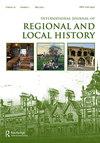Robert Grosseteste, natural law and Magna Carta: national and universal law in 1253
Q2 Arts and Humanities
International Journal of Regional and Local History
Pub Date : 2015-07-03
DOI:10.1080/20514530.2015.1101293
引用次数: 0
Abstract
This paper considers how the English episcopate's complaints (gravamina) of 1253 demonstrate one view of how the king's authority could be curbed through Magna Carta and the Charter of the Forest. The gravamina were drafted by Robert Grosseteste, bishop of Lincoln 1235–1253, and declare that the king is ignoring universal, natural law and man-made common law. They reveal Grosseteste's own view of the relationship between justice and natural law and how this should influence written law codes to ensure the salvation of mankind. Grosseteste interpreted the charters of liberties through natural law, as intended to bring common law and natural law into line with each other to make salvation possible through the exercise of justice. Magna Carta was now not an immediate solution to a local problem, but part of a universal, eternal concern. As the document was issued in the names of all the episcopate, they also consented to this view.罗伯特·格罗斯泰斯特,自然法和大宪章:1253年的国家法和普遍法
本文考虑了1253年英国主教的投诉(gravamina)如何证明了一种观点,即国王的权威如何通过大宪章和森林宪章得到遏制。这份宣言是由1235年至1253年林肯教区的主教罗伯特·格罗斯泰斯特起草的,声明国王无视普遍的自然法和人为的普通法。它们揭示了格罗斯泰斯特自己对正义与自然法之间关系的看法,以及这种看法应如何影响成文法典以确保人类的救赎。格罗斯泰斯特通过自然法解释了自由宪章,目的是使普通法和自然法相互一致,通过行使正义使拯救成为可能。《大宪章》现在不是对一个地方问题的直接解决办法,而是一个普遍的、永恒的关切的一部分。由于该文件是以所有主教的名义发布的,他们也同意这种观点。
本文章由计算机程序翻译,如有差异,请以英文原文为准。
求助全文
约1分钟内获得全文
求助全文
来源期刊

International Journal of Regional and Local History
Arts and Humanities-History
CiteScore
0.30
自引率
0.00%
发文量
10
期刊介绍:
The International Journal of Regional and Local History aims to publish high-quality academic articles which address the history of regions and localities in the medieval, early-modern and modern eras. Regional and local are defined in broad terms, encouraging their examination in both urban and rural contexts, and as administrative, cultural and geographical entities. Regional histories may transcend both local and national boundaries, and offer a means of interrogating the temporality of such structures. Such histories might broaden understandings arrived at through a national focus or help develop agendas for future exploration. The subject matter of regional and local histories invites a number of methodological approaches including oral history, comparative history, cultural history and history from below. We welcome contributions situated in these methodological frameworks but are also keen to elicit inter-disciplinary work which seeks to understand the history of regions or localities through the methodologies of geography, sociology or cultural studies. The journal also publishes book reviews and review articles on themes relating to regional or local history.
 求助内容:
求助内容: 应助结果提醒方式:
应助结果提醒方式:


